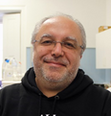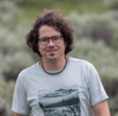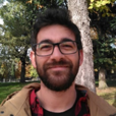
The Centre for Functional Ecology - Science for People & the Planet (CFE) is a R&D unit hosted by the Department of Life Sciences of the University of Coimbra that brings together researchers from different fields of ecology and social sciences, integrating knowledge from genes to the biome level to disentangle the mechanisms responsible for biodiversity maintenance, and for the composition, structure and functioning of biological communities and ecosystems. CFE holds a strong commitment to knowledge transfer to the general public and to the productive sector, with emphasis on the sustainability of territories and local communities.
Among the research groups at the CFE, the Soil Ecology and Ecotoxicology Laboratory (SEEL, see their activities here ) focuses on developing research on terrestrial ecology and ecotoxicology particularly in Mediterranean and Tropical areas. On terrestrial ecology the group has focused on understanding how land management and landscape changes drive soil invertebrate communities (using traditional and trait-based approaches), interaction between diversity and services and how extreme climatic events influence those relationships. More recently, the group has been also focused on studying honeybees and pest control invertebrates, and the different drivers shaping their populations and the rate of the services they provide, always adopting a holistic approach. On ecotoxicology, the focus has been mainly on pesticide risk assessment of soil organisms, developing research to help regulatory decisions. More recently the group has focused also on honeybee ecotoxicology including the use and development of bee testing protocols in the laboratory and the assessment of colony health status under field conditions, adopting a multistressor approach.
SEEL members were and are currently involved in several national and EU research projects. Current projects of interest are:

Head of SEEL
Assoc. Prof. at University of Coimbra
Senior Researcher at CFE
Since 1993 he has been developing research on soil ecology and soil ecotoxicology. On soil ecology, his activities are focused on studying changes on soil biodiversity patterns (using soil invertebrates and trait-based approaches) to assess changes in soil quality derived from changes in land-use and landscape fragmentation in agricultural and forest systems. More recently he is interested in evaluating effects of extreme climatic events on soil organisms and service provision in agro-forest systems (in Mediterranean and sub-tropical systems). Regarding soil ecotoxicology, he has been working mainly in the Mediterranean region and the tropics (mainly Brazil) to assess effects of chemical substances (mainly pesticides) and wastes and to integrate in ERA schemes of contaminated soils. He is currently involved in several H2020, FCT and PDR2020 projects that implement holistic approaches, from a socio-ecological perspective, valuing natural capital as a way to increase the resilience of agricultural landscapes submitted to different stress factors, contributing to the development of different “bio-based” solutions to increase the provision of different ecosystem services, allowing a more sustainable management of the territory. He is a member of several European Workgroups responsible for the elaboration of test guidelines with soil invertebrates, published by ISO and OECD. Between 2009 and 2017 he was an external expert of the EFSA (European Food Safety Authority) attached to the Scientific Panel on Plant Protection Products and their Residues, being involved in the elaboration of scientific opinions the new technical guidance documents for pesticide registration in Europe. Since 2014 is has been appointed head of the thematic panel for Pesticides and GMOs for the Portuguese Food Safety Agency (ASAE). Besides doing active research he is also involved in consulting activities involving both prospective (for Portuguese paper industry, Shell Thiogro and the German Federal Environmental Agency) and retrospective risk assessment (for PETROBRÁS).
As part of the SESS Team, Paulo is supervising the collection of ecological and biological information on key ESPs and pest species from Southern Europe for model development at ALMaSS and also supervising the performance of ecotoxicological tests of selected pesticides and mixtures on honeybees to support development of ESPs models within the ALMaSS modelling framework. He is also responsible for running scenarios in ALMaSS to test the efficacy of measures tested in ECOSTACK and OLIVESIM projects. He coordinates a WP at B-GOOD project dealing with ecological drivers influencing honeybee colony status, focusing on flower resources, contributing, in close collaboration with UJAG and AU, for the development of a flower phenological model to incorporate in the ApisRAM model.

Researcher at Centre for Functional Ecology of the University of Coimbra. During his research carrier he developed skills in ecological data analysis, ecology of mammals, mainly ungulates, and geographic information systems applied to landscape ecology and spatial modelling. Currently he is involved in several national and international research projects (H2020: ECOSTACK, B-GOOD; FCT: OLIVESIM, TOPDEVIL, ECOASSESS; PDR2020: Multiforest). Author of several scientific papers, technical reports and communications. His current research interests include quantitative ecology and ecological data analysis, population estimates and dynamics, landscape ecology and spatial statistics and modelling.
As part of the SESS Team, António Silva is responsible for the construction of ALMaSS landscape scenarios in Portugal (ECOSTACK, B-GOOD and OLIVESIM projects) in close collaboration with UJAG and AU. At the B-GOOD project he is also deeply involved, in close collaboration with UJAG, on the development of the flower phenological model to be included at the ApisRAM model.

Daniel Paredes is a PostDoc in the Department of Wildlife, Fish, and Conservation Biology at the University of California (UCDavis) and at CFE interested in sustainable agriculture and how can we better balance biodiversity conservation with agricultural production. His research explores the ecological mechanisms underlying the delivery of ecosystem services in agricultural landscapes and how local and landscape management practices influence these mechanisms. He aims at designing decision-support tools that help agricultural stakeholders to make wise decisions that minimize the negative effects of agriculture on the environment. Daniel is also extremely interested in ecoinformatics and data management and uses predictive models and computer simulations as his main tools.
As part of the SESS Team, Daniel is responsible for collecting biological and ecological information on pests and ESPs collaborating in the development of agent-based models in ALMaSS of the olive pest Prays oleae and one of its more impactful predators, Chrysoperla carnea (ECOSTACK and OLIVESIM projects).

During her research carrier she developed skills in ecology and behaviour of mammals, gaining expertise in monitoring and sampling schemes, population ecology and behaviour, natural resources and sustainable development, GIS applied to ecology, spatial data analysis and modelling and ecosystem services. Currently she is involved in several projects (H2020: ECOSTACK, B-GOOD; EEA grants: Biosphere Reserves; FCT: OLIVESIM, TOPDEVIL, ECOASSESS), being the scientific coordinator of the project Multiforest, focused on the evaluation of goods and services of forest ecosystems in Portugal. Author of several international publications, technical reports, communications in congresses (oral and posters), and oral communications by invitation in events of science outreach. Her current research interests include animal ecology and behaviour and its implications for species conservation and their ecosystems, landscape ecology, ecosystem services, particularly the ones mediated by animal species, and conservation and management of natural resources.
As part of the SESS Team, Joana Alves is responsible for the collection of management data for the construction of ALMaSS landscape scenarios in Portugal (ECOSTACK, B-GOOD and OLIVESIM projects). At the B-GOOD project he is also deeply involved, in close collaboration with UJAG, on the development of the flower phenological model to be included at the ApisRAM model.

Nuno’s background is in Terrestrial Ecology. In his master thesis, he evaluated climate change effects on isopod populations exposed to metals. Afterwards he was grantee in a couple of SEEL projects, performing ecotoxicological tests with soil organisms. Since 2017, he was involved in the POLL-OLE-GI project to developed and test field protocols to gather information on the honeybee colony development and landscape. Since then, he started his PhD to study the impact of landscape structure and management on the development of honeybee colonies, participating in several projects (EFSA bee data collection, B-GOOD, EU Bee Partnership) to gather data mainly at the colony level.
As part of the SESS Team, Nuno is responsible for the collection of field data on honeybee colonies in several projects (EFSA bee data collection, B-GOOD) and data treatment of bee colony data, collaborating with AU in contributing with data for the development of the ApisRAM model.